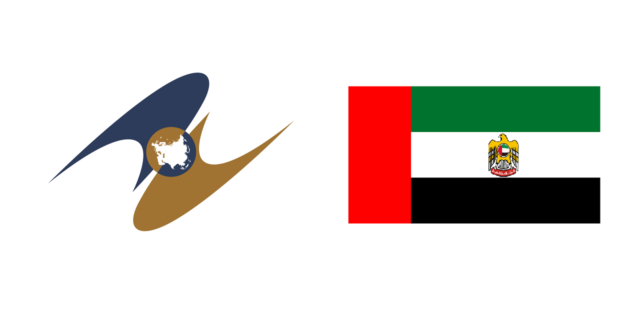United Arab Emirates and Eurasian Economic Union might establish a free trade zone

Geopolitical Report ISSN 2785-2598 Volume 29 Issue 2
Author: Giuliano Bifolchi
The United Arab Emirates (UAE) and Eurasian Economic Union (EAEU) member countries discussed the establishment of a free trade zone, which might become a significant step in strengthening Emirati financial and economic presence in the Eurasian geopolitical chessboard and support Russian financial strategy to contrast Western sanctions’ consequences.
Information background
According to the Ministry of Trade and Integration of the Republica of Kazakhstan, the parties are discussing eliminating custom duties in mutual trade on a wide range of goods, which might increase the volume of mutual trade between the UAE and the EAEU.
The Kazakh Ministry also highlighted the trade turnover between Kazakhstan, one of the EAEU members, and the UAE reached $ 632.6 million. Most of this amount, namely $560 million, falls on the export of Kazakh goods. Among the EAEU members, also Kyrgyzstan has discussed the possibility of opening customs points in the ports of the UAE and Iran (Mir24).
On March 6th, 2023, Andrey Slepnev, Minister for Trade on the Eurasian Economic Commission (EEC), confirmed that EAEU and UAE are taking negotiations on the Emirati territory. The parties previously agreed to work in the fast-track mode (Eurasian Economic Commission).
The EAEU’s geopolitical role
Since the beginning of the Ukraine conflict, under Russian promotion, the EAEU has adopted a foreign policy to expand its members and trade partnership with countries in the Arab-Muslim world and South-East Asia.
The EAEU has often been considered Moscow’s political-economic organisation, established to assure the Russian presence in the post-Soviet space. Established in 2015, the EAEU is directly linked to the post-Soviet period’s first years. It might be interpreted as the result of a historical-political and economic process which involved Russia, Belarus, Kazakhstan, Armenia and Kyrgyzstan attempting to develop their economy by increasing the flow of imports and exports.
Since its creation, however, the West has often criticised the EAEU, perceiving it as the result of the Kremlin’s geopolitical strategy in its blizhnee zarubezhe (near abroad) rather than a project of economic integration.
In the last few years, EAEU member states, especially the Russian Federation, have promoted this organisation and the possibility of enlarging its network of trade partners and members. In this context, the Islamic Republic of Iran signed an agreement to establish with the EAEU a free trade zone to counter Western sanctions, which heavily affect Iran and Russia and find alternative solutions for their economies and import-export activities (SpecialEurasia).
Emirati financial interests in Russia and Central Asia
In the Middle East, the UAE has been highly active in boosting diplomatic and trade relations with EAEU members and Central Asian republics. In December 2022, UAE President Sheikh Mohamed bin Zayed Al Nahyan discussed ways to build on the cooperative relationship between the two countries and several regional and international matters during a phone call with Russian President Vladimir Putin of mutual interest (UAE Ministry of Foreign Affairs & International Cooperation). Previously, in September 2022, the Emirati embassy in the Russian Federation organised an exhibition to promote its culture in the Russian territory (SpecialEurasia).
Emirati interests in the Russian market might support the Kremlin’s pilot project to establish Islamic banking in the country and, therefore, attract foreign direct investments (FDIs) from the Arab-Muslim world, which might boost local infrastructural projects and finance the Russian small and medium enterprises (SpecialEurasia).
The UAE is also interested in expanding its economic presence in Central Asia by financing regional development projects and providing humanitarian aid. In December 2022, the Prime Minister of the Republic of Kyrgyzstan, Akylbek Zhaparov, officially visited Abu Dhabi and met with the UAE Minister of Economy, Abdulla bin Touq Al Marri. During his visit to the UAE, Zhaparov confirmed Kyrgyzstan’s interest in developing an economic partnership with the United Arab Emirates. At the same time, the Emirati side emphasised Abu Dabhi’s desire to enhance its presence and influence in the Central Asian republic (SpecialEurasia).
A month before, in November 2022, Turkmenistan President Serdar Berdimuhamedov paid an official visit to the United Arab Emirates and met with Sheikh Mohammed bin Zayed Al Nahyan holding high-level bilateral talks in an expanded format, with the participation of delegations from both countries. The meeting stressed Turkmenistan’s interest in developing ties with the Gulf monarchies and UAE’s strategy in playing a significant role in the Turkmen market and, consequently, Central Asia (SpecialEurasia).
Why does it matter?
The free trade zone between the UAE and the EAEU has economic significance because it would favour increased import-export and investments between the parties. It also holds a geopolitical weight because it would allow Russia to increase the range of action of the Eurasian Economic Union.
Since the beginning of the Ukraine conflict, Western experts have expressed doubts about the EAEU’s future due to the organisation’s dependence on the Russian economy, which the sanctions have significantly impacted. The eventuality that the EAEU will establish free trade zones with the UAE and Iran represents an attractive opportunity for its state members, especially Russia, allowing them to reach the Middle East markets and, hence, attract investments in their economic development projects and economies.
